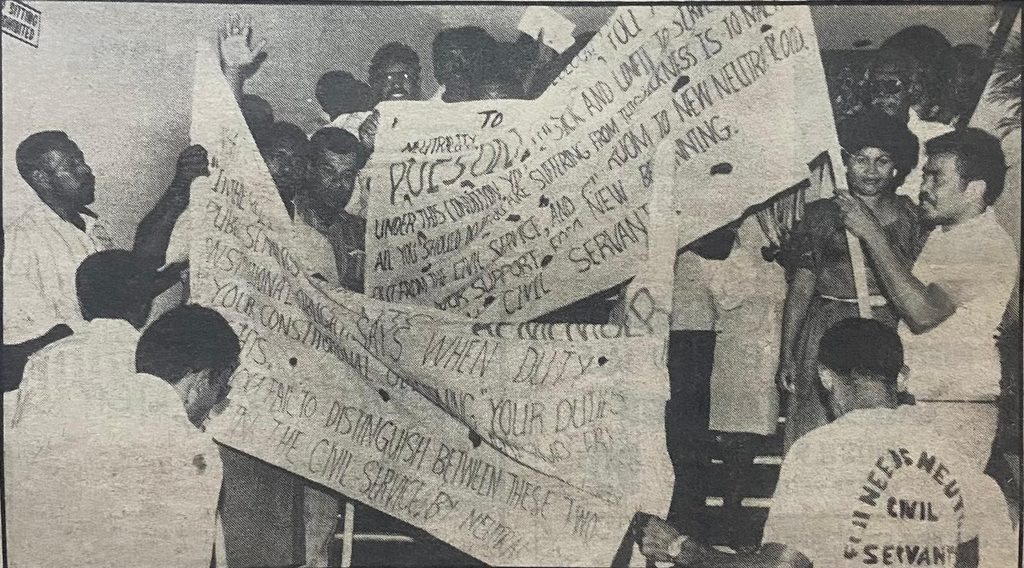Between 70 and 100 civil servants walked out of a Fiji Public Service Association annual meeting in Suva in 1986 after claiming it was illegal.
According to an article published by The Fiji Times on March 15 of that year, the group, known as the FPSA Concerned Group, walked out as the association’s acting president, DP Singh, was delivering his address.
The report said that after the meeting was called to order by association general secretary Mahendra Chaudry, 1443 members picked their ballot papers, giving it a quorum.
A member of the concerned group, Dr Josaia Taka, said the meeting was illegal given that there was no quorum.
He said the hall had a capacity of 746, and it could not accommodate 1400 people.
The article said that amidst the shouting and heated exchanges, Mr Singh threatened to call the police if the members continued to disrupt the meeting.
Mr Singh said the group had tabled several motions, one of which sought to deprive civil servants the right to associate with any political organisation.
“It is needless for me to say that the motion offends the Constitution of Fiji to such an extent that, even if passed, it cannot be enforced because of its illegality,” he said.
He said trade unionism had over the past century championed the cause of democracy and the defence of the oppressed and the poor.
“The situation with the workers today is indeed a sad one. The government has effectively removed the bargaining rights of trade unions by imposing wage restrictions under ministerial orders.”
The FPSA Concerned Group held a meeting outside and about 300 people attended.
One of the organisers, Dr Filimone Wainiqolo, said the group walked out because the FPSA meeting was unconstitutional.
“The association has a membership of about 7304 and the constitution requires 20 per cent members’ physical presence for a quorum,” he said.
Dr Wainiqolo said the group felt it was wrong to involve the association and its members in politics.
He said the group would continue efforts to clear the FPSA of politics.
“The group will file an injunction in the Supreme Court to stop the FPSA executives from using association funds and to declare today’s meeting illegal,” he said.
THE traditional chiefly title of Gagaj Sau Lagfatmaro was restored in the early 1980s to revive the culture and traditions of Rotuma.
An article published by The Fiji Times on January 16, 1985, said the revival was led by Professor Henry Gibson.
In response to claims by the Gagaj Maraf (chief), Faga Solomone said the title was not recognised in Rotuma, however, Prof Gibson said he had a document from the Rotuma Council of Chiefs acknowledging the title.
The title was bestowed upon Prof Gibson in December of 1982.
“The title means that I am the King of the Molmahau clan which includes the seven districts in Rotuma,” Prof Gibson said.
The article referred to a member of the Molmahau clan by the name of Pene Tigarea. He said the title Gagaj Maraf was not Rotuman but a variation of the Tongan name Ma’afu, who was said to have established a kingdom in Rotuma early in the 17th century.
Prof Gibson said the title (Gagaj Sau Lagfatmaro) was held by the first king of Rotuma, before Ma’afu arrived.
Earlier, a letter was sent to The Fiji Times from Mr Ieli Irava of Malhaha claiming the title Gagaj Maraf was rightfully Mr Solomone’s, given that he was a member of the Noatau clan.
The clan had been selecting the Garaj Maraf since the 19th century.
“The revival of the title, Gagaj Sau Lagfatmaro, is an attempt on my part to revive the true culture, tradition and identity of the people of Rotuma,” he said.
“Whoever holds the title is regarded as the father of the clan.
“The existence of politics in the election of chiefs in Rotuma is destroying our culture.”
According to the article, Prof Gibson denied a report by Radio Fiji that he was filing a writ in the Supreme Court to challenge the present Gagaj Marav, Faga Solomone.
“I will only take action if people keep disputing the title of Gagaj Sau Lagfatmaro.”

